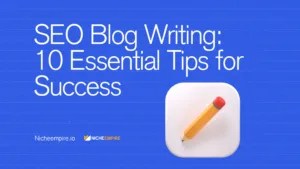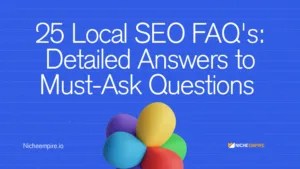Every day, people, business owners, and big corporations use social media to showcase their brands to billions of global social media users. That’s because consumer behavior has changed, and businesses are not run as before.
With social media SEO, you can enhance your reach and connect deeply with your target audience. But this isn’t made possible by just being on social media; it requires a working plan for search engine optimization (SEO).
In this article, we will share effective social media SEO strategies to get maximum visibility for your business.
Overview
- What is Social Media SEO
- Platform-Specific Social Media SEO Strategies
- Best Practices for Social Media SEO
- Final Words
- Frequently Asked Questions
What is Social Media SEO
Social Media SEO optimizes your content for more visibility on search engines and social platforms.
However, social media does not directly affect rankings; it can indirectly contribute to reach and brand awareness. With billions of daily users, social media SEO matters for these reasons.
Ways Social Media Impacts SEO
1. Higher Visibility
Social media posts and profiles can rank on search engines. You can easily find YouTube vides, Pinterest images, X and LinkedIn posts on Google search results.
Sometimes, these social media content can appear before a website.
2. Drive Engagement
Social media SEO can influence engagement like shares, comments, and likes, signaling content relevance to algorithms.
While these social signals don’t directly affect your rankings, they boost your visibility.
3. Organic Traffic
Social media can bring more visitors to your website and store. An optimized social media post or video can drive traffic to your website.
For instance, one viral TikTok video can improve your brand awareness and website traffic.
4. Backlinks and Mentions
Mentions and shares can increase your website’s domain authority and brand awareness.
Platform-Specific Social Media SEO Strategies
These strategies will boost your visibility on social media and search engines.
General SEO Strategies for All Platforms
For general social media platforms, these tactics will increase your reach.
- Add relevant keywords in your social media profile bio, content captions, and hashtags.
- Use ALT text and descriptive file names to optimize your images and videos for SEO.
- Add your website links to your bios, related posts, and descriptions.
- Encourage audience engagement by asking questions, running polls, and replying to comments.
YouTube SEO
YouTube is the second biggest search engine, and YouTube videos easily appear in search results.
Here’s how to boost your YouTube videos.
Keyword Optimization
- Find relevant keywords in your niche that answer your audience’s concerns.
- Create videos that suit your audience’s intents and include your keywords in your titles, descriptions, and tags.
Video Captions and Transcripts
- Include subtitles to increase your video’s appeal and to enable people to read along. This can improve your watch time, which is vital for ranking.
Thumbnails
- Create eye-catching but sincere thumbnails to entice clicks and increase CTR (Click-through rate). Your thumbnails should complement your topic and not necessarily repeat the title.
Playlists
- Organize your videos into playlists for easy viewing and sorting, and include keywords in the playlist names.
You will like our detailed article on YouTube SEO.
Instagram SEO 
This is how to increase your reach on this visual-focused platform,
Optimize Bio
- Optimize your Instagram bio by adding relevant keywords for better understanding.
- Add a call-to-action (CTA) and your website link to drive more traffic.
Be Strategic with Hashtags
- While you can include up to 30 hashtags in your posts, Instagram advises using 3 – 5 hashtags.
- Use targeted hashtags to get more reach.
Add Alt Text to Images
- Add ALT text to your images to enhance searchability.
Encourage Engagement
- Encourage engagement by asking questions and running polls or quizzes. They lead to an increase in shares, saves, and comments, which boosts the Instagram algorithm.
Learn all about Instagram SEO.
Facebook SEO
Facebook is an excellent social media platform for business and community growth due to its wide range of audience.
Optimize Your Page and Posts
- Optimize your page by using the appropriate page name.
- Make your description clear and concise, and add your keywords.
- Create posts with your keywords and make your headlines enticing.
- Join relevant FaceBook groups and often engage to get more visibility.
- Public groups with high engagement can rank for keywords.
Here’s more on FaceBook SEO.
TikTok Optimization
This is how to boost your reach on this fast-paced platform.
- Find the right keywords using TikTok’s search features. Type your topic and watch the autofills for keywords to include in your captions and hashtags.
- Mention the main keywords in your videos; TikTok transcribes your audio, so it’s important for searchability.
- Encourage your audience to save and share your videos to increase your reach.
Find out more about TikTok SEO.
X (Twitter SEO)
Use these X (Twitter) SEO tactics to get more visibility.
Optimize Your Twitter Profile for SEO
- Ensure your Twitter handle is keyword-rich.
- Add niche-specific keywords to your posts to connect with more followers.
- Create content that is informative and resonates with your audience.
- End your posts with 2 -3 hashtags that best fit your message and brand.
- Reply promptly to messages, comments, and mentions.
LinkedIn SEO
LinkedIn SEO can boost your professional growth, helping you reach more business executives.
Optimize Profile
Optimize your profile to show your people what you do and offer. For example, “SEO & Social Media Marketing for Small Businesses | Organic and Paid Traffic Growth.”
Create Articles with Your Keywords
Use your keywords to create quality articles or posts with value and practical takeaways. Optimized LinkedIn articles rank well on search engines.
Engage on Other Posts
Comment and provide insights on high-traffic posts to improve your visibility.
Pinterest SEO
Pinterest doubles as a search engine and a social media platform. Pinterest Pins rank on search results and are great for driving traffic to your website.
Create Pins with Keywords
Create pins with valuable content and include your keywords. Make your description appealing, and also add your keywords.
Use Pinterest Boards Properly
Add descriptive terms for your boards with long-tail keywords to rank higher.
Add ALT Text and Keywords in Pins
Save your pins with keyword-rich names to boost your content reach.
More on Pinterest SEO.
Best Practices for Social Media SEO
SEO requirements differ across platforms, but these are best practices.
1. Use Keywords Naturally
Add your keywords in bios, captions, hashtags, and video scripts naturally.
2. Post Consistently
Consistency is important for SEO. The more you publish, the more engagement you get, affecting your rankings.
3. Cross Promote Between Platforms and Your Website
Cross-promote your content on social media and your web pages. For example, you can embed your YouTube videos in your blog posts or other social media platforms.
4. Track with Analytics and Adjust
Use each social media insight to monitor your content performance. Refine your strategy based on data and keep tracking.
5. Leverage User-Generated Content (UGC)
Encourage your audience to share posts that promote your brand and profile.
Final Words
Social media is not only for social interaction and engagement, it is a goldmine with reach spreading across search engines.
Optimize your profiles, create high-quality shareable content, and use platform-specific tactics to build awareness and authority.
Use these social media strategies to drive drive more traffic and visibility today.
Which of these strategies did you find intriguing?
Frequently Asked Questions
What is social media SEO?
Social media SEO involves optimizing your profile and content to appear high on search results.
Does Social Media Improve SEO?
Social media SEO indirectly impacts SEO by driving traffic and brand awareness through engagement.
How to Optimize Your Social Media for SEO?
- Include relevant keywords in your bio, such as description, captions, content, and hashtags.
- Post consistently and cross-promote across social media and your website.
- Link your website to your social media page.
- Optimize your images, videos, and infographics with keywords to boost reach.



